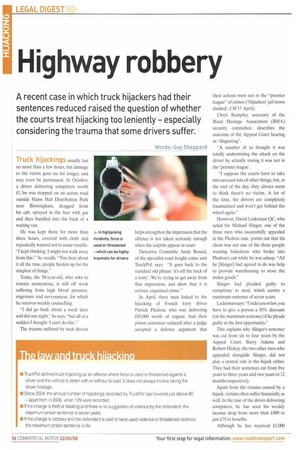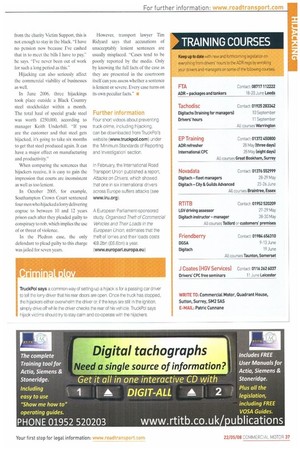Highway robbery
Page 36

Page 37

If you've noticed an error in this article please click here to report it so we can fix it.
A recent case in which truck hijackers had their sentences reduced raised the question of whether the courts treat hijacking too leniently especially considering the trauma that some drivers suffer.
Words: Guy Sheppard Truck hijackings usually last no more than a few hours, but damage to the victim goes on for longer, and may even be permanent. In October, a driver delivering computers worth £1.3m was stopped on an access road outside Hams Hall Distribution Park near Birmingham, dragged from his cab, sprayed in the face with gas and then bundled into the back of a waiting van.
He was kept there for more than three hours, covered with cloth and repeatedly warned not to cause trouble. "I kept thinking 'I might not walk away from this'," he recalls. "You hear about it all the time, people beaten up for the simplest of things."
Today, the 58-year-old, who asks to remain anonymous, is still off work suffering from high blood pressure, migraines and nervousness, for which he receives weekly counselling.
"I did go hack about a week later and did one night,he says, "but all of a sudden I thought 'I can't do this'," The trauma suffered by such drivers helps strengthen the impression that the offence is not taken seriously enough when the culprits appear in court.
Detective Constable Andy Round, of the specialist road freight crime unit TruckPol, says: "It goes back to the standard old phrase 'it's off the back of a lorry'. We're trying to get away from that impression, and show that it is serious, organised crime."
In April, three men linked to the hijacking of French lorry driver Patrick Pledron, who was delivering £85,000 worth of cognac, had their prison sentences reduced after a judge accepted a defence argument that their actions were not in the "premier league" of crimes (`Hijackers' jail terms slashed'. CM 17 April).
Chrys Rampley, secretary of the Road Haulage Association (RHA) security committee, describes the outcome of the Appeal Court hearing as "disgusting".
"A number of us thought it was totally undermining the attack on the driver by actually stating it was not in the 'premier league'.
"I suppose the courts have to take into account lots of other things, but, at the end of the day, they always seem to think there's no victim. A lot of the time, the drivers are completely traumatised and won't get behind the wheel again."
However, David Lederman QC, who acted for Michael Slinger, one of the three men who successfully appealed in the Pledron case, points out that his client was not one of the three people wearing balaclavas who broke into Pledron's cab while he was asleep. -All he [Slinger' had agreed to do was help to provide warehousing to store the stolen goods."
Slinger had pleaded guilty to conspiracy to steal, which carries a maximum sentence of seven years.
Lederman says: "Under anew law, you have to give a person a 30% discount (on the maximum sentence) if he pleads guilty at the first opportunity" This explains why Slinger's sentence was cut from six to four years by the Appeal Court. Barry Adams and Robert Hickey, the two other men who appealed alongside Slinger, did not play a central role in the hijack either. They had their sentences cut from five years to three years and two years to 12 months respectively.
Apart from the trauma caused by a hijack, victims often suffer financially as well. In the case of the driver delivering computers, he has seen his weekly income drop from more than £400 to just £75 in benefits.
Although he has received £1,000 from the charity Victim Support, this is not enough to stay in the black. "I have no pension now because I've cashed that in to meet the bills I have to pay," he says. "I've never been out of work for such a long period as this."
Hijacking can also seriously affect the commercial viability of businesses as well.
In June 2006, three hijackings took place outside a Black Country steel stockholder within a month. The total haul of special grade steel was worth .E250,000, according to manager Keith Underhill. "If you are the customer and that steel gets hijacked, it's going to take six months to get that steel produced again. It can have a major effect on manufacturing and productivity."
When comparing the sentences that hijackers receive, it is easy to gain the impression that courts are inconsistent as well as too lenient.
In October 2005, for example, Southampton Crown Court sentenced four men who hijacked a lorry delivering cognac to between 10 and 12 years prison each after they pleaded guilty to conspiracy to rob, which implies the use of or threat of violence.
In the Pledron case, the only defendant to plead guilty to this charge was jailed for seven years.
However, transport lawyer Tim Ridyard says that accusations of unacceptably lenient sentences are usually misplaced. -Cases tend to be poorly reported by the media. Only by knowing the full facts of the case as they are presented in the courtroom itself can you assess whether a sentence is lenient or severe. Every case turns on its own peculiar facts." a Further information Four short videos about preventing truck crime, including hijacking, can be downloaded from TruckPol's websIte (www.truckpolcorn) under the 'Minimum Standards of Reporting and Investigation section.
In February, the International Road Transport Union published a report, Attacks on Drivers, which showed that one in six international drivers across Europe suffers attacks (see www.iru.org).
A European Parliament-sponsored study, Organised Theft of Commercial Vehicles and Their Loads in the European Union, estimates that the theft of lames and that' loads costs €8.2bn (E6.6bn) a year. (www.europarLeuropa.eu)












































































































































































